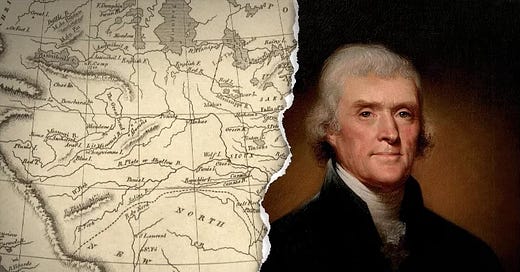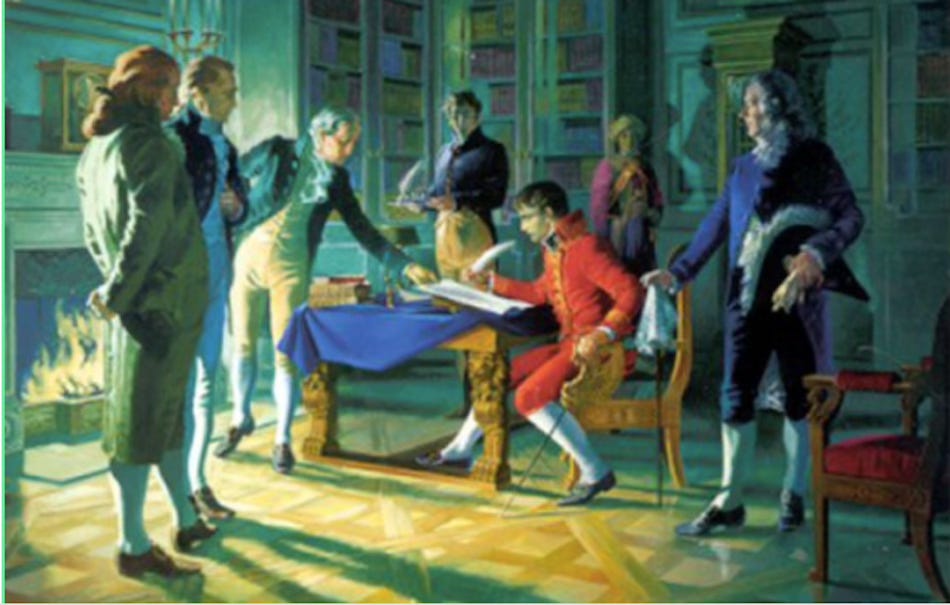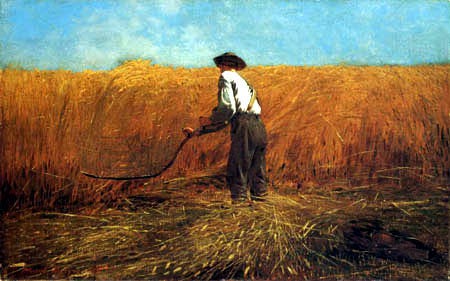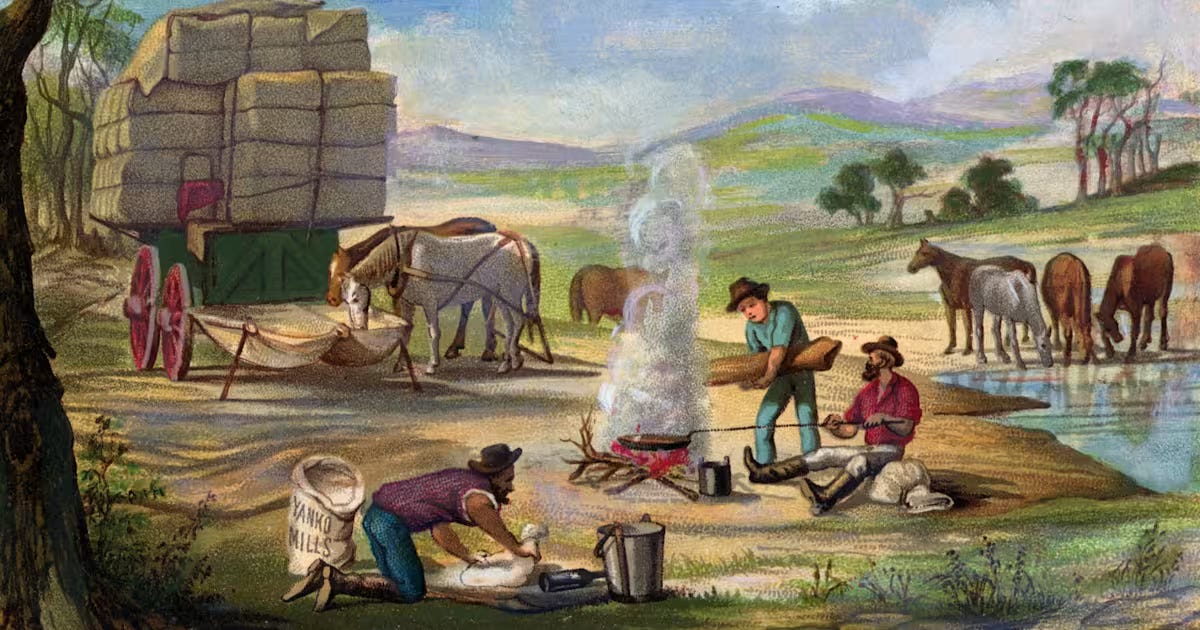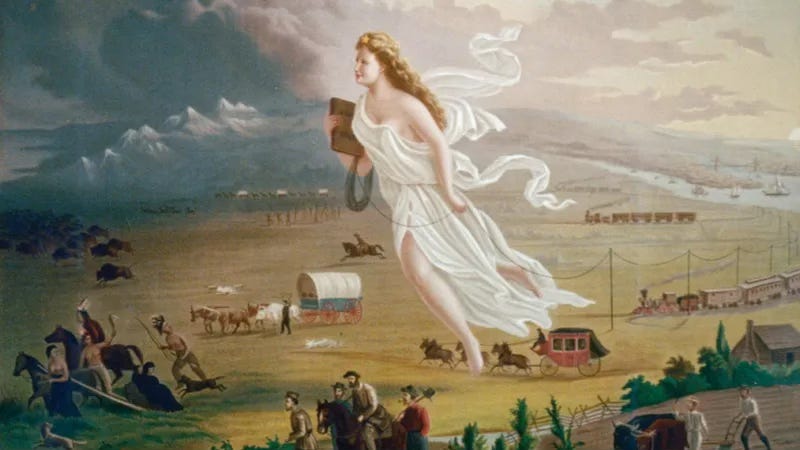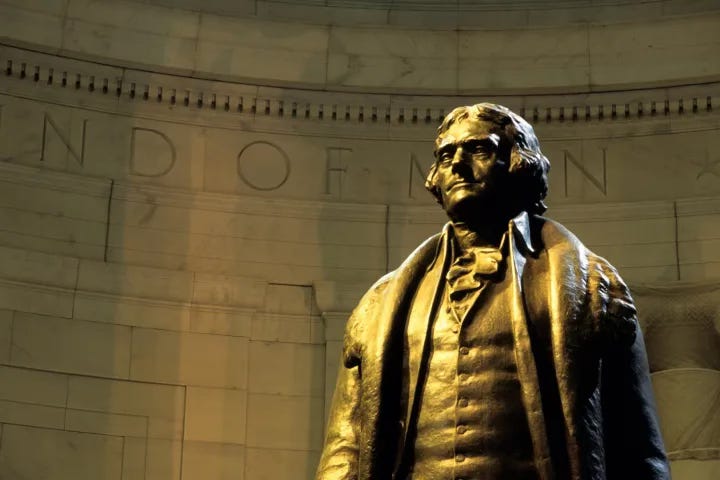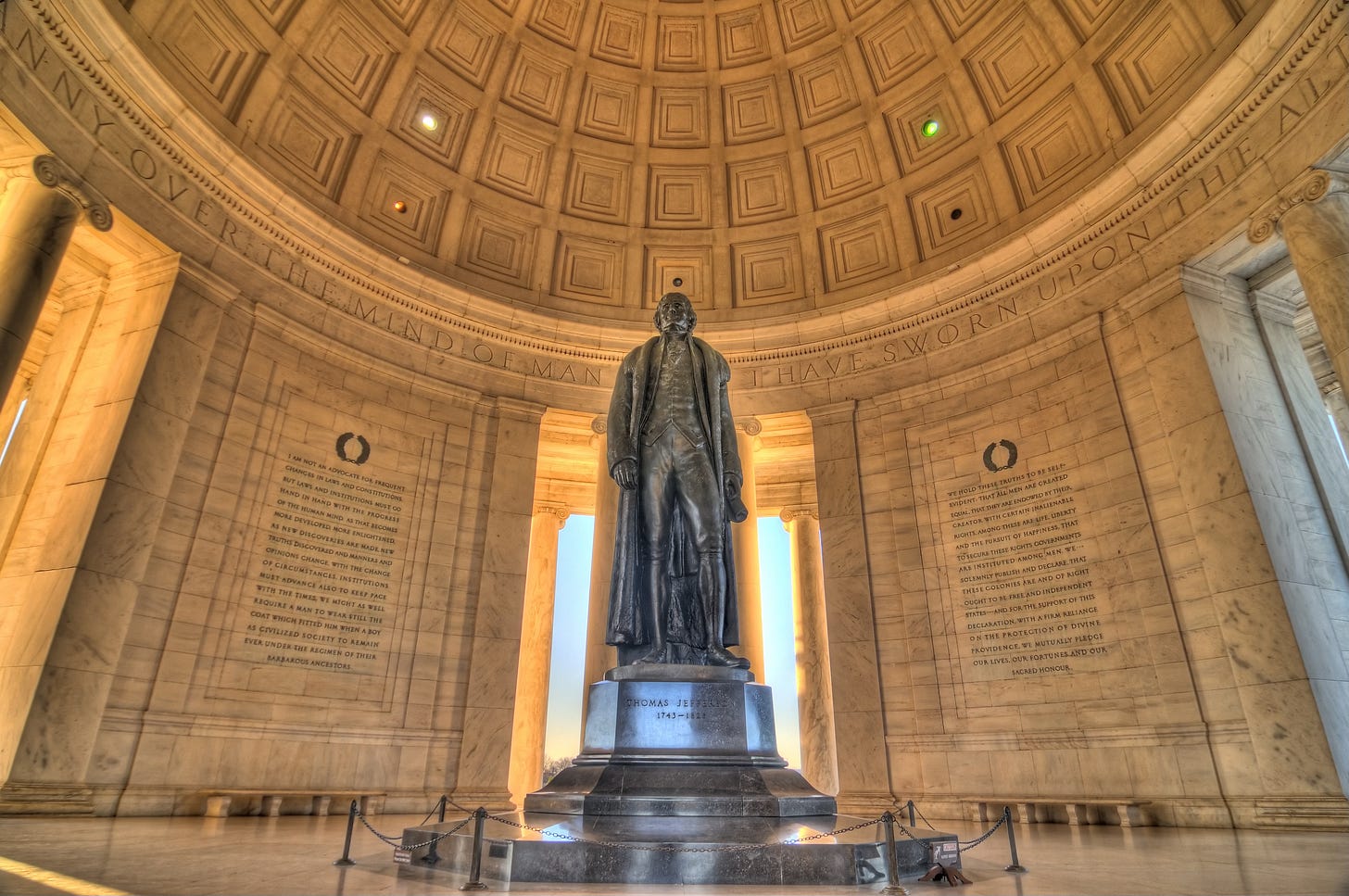The Louisiana Purchase Part 5: An Empire of Liberty: Jefferson’s Vision for America
Louisiana Purchase Series, Part 5
By The Bayou Insider Staff
In 1803, the United States made a bold, unprecedented move that would forever alter the course of its history. With the stroke of a pen and the backing of a deeply divided Congress, President Thomas Jefferson finalized the Louisiana Purchase — a land deal so vast in scope and significance that it nearly defied comprehension. In one sweeping act of diplomacy, the young republic more than doubled its size, acquiring over 800,000 square miles of untamed wilderness stretching from the Mississippi River to the Rocky Mountains.
For $15 million — about four cents an acre — the United States secured fertile plains, rich river systems, mountain ranges, and access to the port of New Orleans, a vital commercial lifeline. On paper, it was a bargain of epic proportions. But the Louisiana Purchase was far more than a real estate transaction. Beneath the maps, surveys, and diplomatic telegrams lay something far more powerful: a bold and idealistic vision for what America could and should become.
To Jefferson, this wasn’t merely about territory or trade routes. It was about destiny. He saw in the western frontier not just land, but a canvas — one on which the great American experiment in liberty, self-rule, and human potential could be expanded and preserved. At a time when monarchies and empires dominated the world, Jefferson dared to imagine something different: a sprawling republic of citizen-farmers, united not by bloodlines or crowns, but by shared principles and individual freedom.
This wasn’t just about buying land. It was about building a future — a future rooted in liberty, grounded in self-reliance, and destined, in Jefferson’s mind, to become a light to the nations.
A Purchase Beyond Borders
To most observers in 1803, the Louisiana Purchase was nothing short of a geopolitical coup. It handed the fledgling United States full control of the Mississippi River — the lifeline of the North American interior — and guaranteed unfettered access to the port of New Orleans, a bustling commercial hub critical to western farmers and traders. It opened vast, fertile plains for agriculture, offered the promise of natural resources yet undiscovered, and effectively removed France as a colonial rival on the continent. For $15 million, the U.S. had secured its future as a continental power.
But to President Thomas Jefferson, the purchase was far more than a diplomatic success or a land grab. It was the manifestation of a deeper ideological mission — the physical foundation of a civic, moral, and philosophical dream. Jefferson saw the republic as fragile, threatened not only by foreign powers but by internal corruption, inequality, and the creeping influence of industrialism. He feared the rise of densely populated cities, powerful financial institutions, and class divisions that could mirror the monarchies of Europe.
The answer, in Jefferson’s eyes, was expansion — not for conquest, but for cultivation. He believed that liberty needed space to thrive. The American ideal, as he envisioned it, rested on the shoulders of free men who owned their land, worked it with their hands, and participated actively in local democracy. The crowded cities of the eastern seaboard, he believed, were already beginning to drift toward centralization and decay. But the western frontier held promise. It was a blank slate — a place where the values of the Revolution could be renewed and preserved.
The Louisiana Purchase wasn’t just a stroke on a map — it was a stroke of ideological genius. It secured the western frontier for a new generation of Americans, but more importantly, it secured Jefferson’s vision for a self-governing republic rooted in individual liberty, agrarian virtue, and decentralized power. In this vast new territory, Jefferson saw the potential to write a new chapter of American freedom — one acre at a time.
A Nation of Yeoman Farmers
At the heart of Jefferson’s vision for America was a profound and unwavering belief in the virtue of the common man — not the merchant or the industrialist, but the independent farmer, working his own land with diligence, integrity, and purpose. In Jefferson’s ideal republic, it was the yeoman farmer who best embodied the civic virtues necessary for a free and just society. He was the backbone of the nation, the steward of liberty, and the guardian of public morality.
Jefferson harbored a deep skepticism toward the rising power of cities, the influence of financial institutions, and the growth of factories — forces he believed mirrored the aristocratic corruption of Europe. Urban life, in his view, created dependency. Large banks, stock speculation, and wage labor disconnected individuals from the fruits of their own labor, making them vulnerable to manipulation and less invested in democratic governance.
In contrast, the small-scale, self-sufficient farmer was anchored — to the land, to his family, and to his community. He had no master but nature, and his success depended not on influence or inheritance, but on hard work and personal responsibility. Jefferson believed such individuals were more likely to be informed citizens, capable of self-rule, immune to the seductive pull of power, and grounded in traditional values. He saw their independence as the key to the republic’s health and longevity.
The Louisiana Territory, with its sweeping plains, river valleys, and fertile soil, offered a nearly limitless frontier on which this vision could flourish. It was a safeguard against the rise of a permanent underclass, a way to ensure that each new generation of Americans could own land, cultivate it, and claim a stake in the republic’s future. The West became Jefferson’s insurance policy for liberty.
In one of his most quoted reflections, Jefferson wrote, “Those who labor in the earth are the chosen people of God, if ever He had a chosen people.” That wasn’t mere poetry — it was political philosophy. To preserve the spirit of ’76, Jefferson believed, America must remain a nation of farmers.
And with the Louisiana Purchase, he had taken the first step toward ensuring that the republic’s soul — its agrarian character and civic virtue — could endure well beyond his time.
Liberty Through Land
For Jefferson, land ownership wasn’t merely a measure of wealth — it was the very foundation of freedom. In his republican worldview, liberty was not something bestowed by governments or secured by declarations alone. It was rooted in the real, tangible ability of individuals to live independently, free from the control of landlords, financiers, or centralized authority. And in the early 19th century, nothing symbolized that independence more than owning your own land.
A man who owned and worked his land could provide for his family without relying on the government or employer. He could speak and vote his conscience without fear of retaliation from those who controlled his livelihood. He could raise his children according to his values, practice his faith without interference, and pass down a legacy of freedom to the next generation. In short, land was the anchor of both economic security and political autonomy.
This belief was drawn from classical republican theory, which held that liberty required virtue, and virtue required independence. But Jefferson gave it a uniquely American expression. In Europe, land had long been hoarded by monarchs, aristocrats, and landed gentry. The vast majority of people were tenants, laborers, or serfs, dependent on the elite class for their survival. That model had bred inequality, revolution, and stagnation.
America, by contrast, offered a clean slate — a place where property could be distributed more widely, and where the average citizen could live not under the thumb of nobility, but by the work of his own hands. The Louisiana Territory multiplied that possibility tenfold. Suddenly, there was room for millions of future farmers, homesteaders, and pioneers — all with the chance to participate fully in the American experiment.
Jefferson believed this democratization of land would lead to a more stable, more virtuous, and more just society. If liberty was the seed, land was the soil in which it could grow.
With the stroke of a pen in 1803, the United States did not just expand its geography — it expanded its capacity for freedom. It took a monumental step toward becoming not only a larger nation, but a freer one — where liberty was not just a principle on parchment, but a reality rooted in the earth itself.
A Moral Mission
Jefferson’s vision of an “Empire of Liberty” was radical for its time — not because it sought to dominate others, but because it aimed to inspire them. In an age when European powers expanded their influence through conquest, colonization, and military force, Jefferson imagined a different kind of empire: one not built on submission, but on self-government. One that would grow not through coercion, but through example.
To Jefferson, America’s success as a republic placed it under a unique obligation. The ideals of the Revolution — liberty, equality (as he understood it), and popular sovereignty — were not meant to remain confined to the original thirteen states. He believed those principles were universal truths, and that the United States had a moral responsibility to carry them westward, establishing free institutions in every new territory settled by American citizens.
Expansion, in this view, wasn’t an act of ambition. It was a mission of principle. Jefferson likened the spread of American ideals to seeds scattered across the soil — each new state or settlement a place where liberty could take root and flourish. He believed that by offering the world a successful model of republican government, America could be a beacon for oppressed peoples everywhere.
Yet, as with many noble visions, this one was not without self-interest. Jefferson was not only a statesman, but a deeply political man. He hoped that new western territories, settled largely by farmers and frontiersmen, would be populated by individuals sympathetic to his Democratic-Republican ideals — states’ rights, limited federal power, and agrarian independence. This, he calculated, would help counterbalance the influence of Federalist strongholds in the urban and commercial centers of the Northeast.
In that way, the Louisiana Purchase was as much a political strategy as it was a philosophical statement. Jefferson understood that shaping the demographic and ideological future of the republic would be essential to preserving its founding principles. In his mind, liberty could not remain static. It had to be carried, extended, and safeguarded — not just by laws and documents, but by people committed to living it out.
Despite its complexities, the “Empire of Liberty” was a deeply aspirational idea. It cast America not as a traditional empire, but as a moral example to the world — a republic that expanded not to rule, but to share the light of freedom.
A Lasting Legacy
Despite its deep contradictions and moral blind spots, Jefferson’s vision of an “Empire of Liberty” left an indelible mark on the American character. It did more than shape policy or guide westward expansion — it infused the national psyche with a sense of mission. The idea that the United States was more than a nation — that it was a cause, a model, a beacon of liberty — took root during Jefferson’s presidency and would go on to define American self-perception for generations to come.
Throughout the 19th century, this vision continued to evolve, often in ways Jefferson never anticipated — and sometimes in ways that distorted his original ideals. The Homestead Act of 1862, which granted settlers 160 acres of free land in exchange for cultivating it, directly reflected Jefferson’s belief in land as the foundation of freedom. Yet it also accelerated the displacement of Native peoples and intensified the environmental transformation of the West.
Likewise, the doctrine of Manifest Destiny — the belief that it was America’s divine right to expand from coast to coast — was a clear ideological descendant of Jeffersonian thought. But where Jefferson envisioned a republic of self-governing citizens, Manifest Destiny often cloaked expansionist ambition in the language of providence. It merged liberty with empire in ways that could justify conquest and cultural erasure under the banner of national greatness.
Still, the core ideas remained potent: the self-made individual, the sanctity of private land ownership, the belief that liberty can — and should — spread beyond its original boundaries. These themes helped shape not only American expansion but also American identity. They were echoed in political speeches, school textbooks, and civic myths. The American Dream itself — the notion that anyone, with hard work and a patch of earth, can build a better future — draws directly from Jefferson’s agrarian ideal.
Even today, when Americans debate the meaning of freedom, the proper size of government, or the cultural divide between urban centers and rural communities, they are often — whether knowingly or not — channeling Jefferson’s legacy. His influence lingers in modern political rhetoric, in land-use debates, in discussions about education, economic opportunity, and even foreign policy.
The Louisiana Purchase made Jefferson’s dream geographically possible — stretching the borders of the United States across a continent. But the ideals behind it made his vision spiritually enduring. It provided a philosophical foundation that would guide America’s aspirations — and its contradictions — for centuries.
And while history has exposed the flaws in that vision, it has not extinguished its power. The “Empire of Liberty” still invites reflection, still stirs debate, and still shapes the ongoing American story.
Conclusion: A Dream That Still Echoes
In the end, Thomas Jefferson gave America more than a vast swath of new territory — he gave it a philosophical compass. Through the Louisiana Purchase, he didn’t just expand the borders of a young republic; he expanded its imagination — about who it could become, what liberty could look like, and how a nation of ordinary citizens might shape the future through freedom, land, and self-government.
Jefferson’s dream was one of direction as much as destination. He believed that liberty was not static, but expansive — something that should grow with the people, rooted not in elite institutions, but in the lived experience of the farmer, the craftsman, the settler, the citizen. It was a vision that empowered individuals to participate in the life of the nation, not as subjects, but as co-creators of its destiny.
And yet, the legacy of that dream is complicated. History has laid bare the flaws, inconsistencies, and injustices that traveled alongside it — the dispossession of Native peoples, the entrenchment of slavery, the selective application of liberty. These were not minor footnotes but fundamental tensions that would ignite future struggles and shape the national conscience.
Still, the core of Jefferson’s vision — the belief that freedom belongs in the hands of the many, not the few — has endured. It has inspired reformers and resisted tyrants. It has been reinterpreted and reclaimed by every generation seeking to live more fully into the promise of the republic.
The “Empire of Liberty” remains one of the most powerful and contested ideas in American political life. It is both a symbol of hope and a mirror of our national contradictions. It invites us not only to remember Jefferson’s ideals, but to reckon with how we have honored — and failed — them.
As we continue this series and explore the wide-ranging consequences of the Louisiana Purchase, we’d do well to remember that it wasn’t just the map of America that changed in 1803. It was its mission. And that mission — to build a nation where liberty is lived, not just promised — still echoes across the land.
Sources & Suggested Readings
Library of Congress – Thomas Jefferson Papers
Jefferson, Notes on the State of Virginia
Joseph Ellis, American Sphinx: The Character of Thomas Jefferson
Sean Wilentz, The Rise of American Democracy
Gordon S. Wood, Empire of Liberty: A History of the Early Republic
Call to Action
Enjoyed this look into Jefferson’s vision and the legacy of the Louisiana Purchase?
There’s more where that came from. Subscribe to The Bayou Insider and follow our ongoing series as we dig deeper into the untold stories, bold decisions, and lasting consequences of one of the most pivotal moments in American history. From frontier struggles to founding ideals, we’re unpacking how the Louisiana Purchase shaped not just our state — but the soul of a nation.
Join us, and never miss a chapter of Louisiana’s story.

